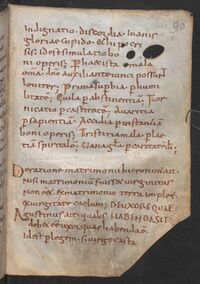Collectio XXX capitulorum (De ratione matrimonii)
| Title | Collectio XXX capitulorum |
|---|---|
| Key | |
| Alternative title | De ratione matrimonii |
| Size | very small (less than 100 canons) |
| Century | saec. VIII |
| European region of origin | Southern Germany? |
| Main author | Sven Meeder |
| Main author | Christof Rolker |
| Structure | by topic |
| No. of manuscripts | many (10 to 99) |
The canonical tract known as the De ratione Matrimonii is an excerpt from book 45 of the Collectio Hibernensis on marriage. Its earliest manuscript witnesses date from the early ninth century, but it is plausible that the tract was excerpted from a full copy of the Collectio Hibernensis in the eighth century. De ratione Matrimonii enjoyed a wide circulation: at least 24 manuscripts witnesses survive, of which most contain excerpts. The collection has been edited by Kunstmann in 1861 from a single manuscript witness: München, BSB, Clm 6242.
Contents and character

The collection has thirty chapters with—in total—about 59 canonical rules on various aspects of marriage. In many of the manuscript witnesses, the chapters are numbered, and the title De ratione matrimonii occurs in most copies. Most of the tract's individual canons are introduced by an explicit attribution. As for named authorities, Jerome tops the list with 10 attributions, followed closely by Augustine with 9 attributions. Paul with 8 references (including one 'item'), while other biblical references include Isaias, Moses, Tobias, or ‘Lex’ and ‘in Euangelio’. In total 20 canons are explicitly linked to the Bible, with more biblical verses featured within some of the patristic canons.
The work is likely to have been one of these canonical works that functioned on a local level. It is a brief and practical tract on ‘legitimate marriage’ that stays away from the complex rules on consanguinity, inheritance, or doctrinal discussions. Instead, it offers moral guidelines on continence and chastity within marriage. The focus is very much on the prerequisites of 'legitimate' marriage and on preserving sexual continence within marriage. It emphasizes the spiritual danger of adultery and explains the grounds of divorce and the intricacies of remarriage. It appears to be a particularly useful work for practical advice on married life, with a lay audience in mind.
Manuscripts and transmission
There are at least 23 extant manuscripts which contain the De ratione Matrimonii, dating from as early as the early ninth century to as late as the twelfth, ranging geographically from northern France to Italy. Its earliest and most complete witnesses all seem to originate from southern Germany, which may be where the tract was first compiled. The sigla in the following table are those used by the editors of the critical edition-in-progress.
| Sigla | Manuscript | Chapters |
|---|---|---|
| A | Avranches, BM, 146 (saec. xi-xii) | I-VIII |
| B | Bamberg, Staatsbibliothek, Msc.Can.9, fols 203vff (saec. x-xii?) | I-II, X-XI, XIIII, XVII, XVIII, XXII, XXVIII |
| B2 | Bamberg, Staatsbibliothek, Msc.Can.9, fol 211r (saec. x-xii?) | II |
| F | Firenze, Biblioteca Medicea Laurenziana, Plut. XX 48 (saec. xiiin) | ... |
| Fr | Freiburg, Universitätsbibliothek, 8 (saec. ix2/2) | I-VIII |
| L | London, British Library, Cotton Cleopatra C.viii (saec. xex-xi1/2) | I-V, VII, IX |
| Mo | Montecassino, Biblioteca statale del Monumento nazionale di Montecassino, 1 (saec. xi4/4) | ... |
| Mp | Montpellier, Bibliothèque Interuniversitaire. Section de Médecine, H 137, fol. 229-230 (saec. xi-xii?) | I-VIII |
| M1 | München, BSB, Clm 6241 (saec. xex) | I-II, X-XI, XIIII, XVII, XVIII, XXII, XXVIII |
| M2 | München, BSB, Clm 6242 (shortly after 810) | I-XXX |
| M3 | München, BSB, Clm 6245 (saec. ixex-xiin) | I-II, X-XI, XIIII, XVII, XVIII, XXII, XXVIII |
| Pa | Palermo, Archivio della Cattedrale, 14 (saec. xii) | ... |
| P1 | Paris, BnF, lat. 3839 (saec. xi?) | I-VIII |
| P2 | Paris, BnF, lat. 3839A (saec. xi?) | I-VIII |
| P3 | Paris, BnF, lat. 3852, fols 2v-3r (saec. xex-xiin) | I-VIII |
| P4 | Paris, BnF, lat. 1557, fols 27vb-28rb (saec. ix3/4) | ... |
| R | Rouen, BM, 702 (E.27) (saec. xi) | I-V, VII-VIII |
| V1 | Città del Vaticano, BAV, Pal. lat. 973 (saec. ix2/2) | II, XI |
| V2 | Città del Vaticano, BAV, Reg. lat. 407 (1430) | II, XI |
| V3 | Città del Vaticano, BAV, Reg. lat. 421 (saec. xv) | II, XI |
| V4 | Città del Vaticano, BAV, Vat. lat. 3791 (saec. xiex) | I-VIII |
| W1 | Wien, ÖNB, Cod. 1370 (saec. ix1/2) | I-XXX |
| W2 | Wien, ÖNB, Cod. 2198, fols 81v-86v? (saec. x) | I-II, X-XI, XIIII, XVII, XVIII, XXII, XXVIII |
| W3 | Wien, ÖNB, Cod. 424, fols 7r-9v (partial) (saec. ix2/4) | I-XXVIII |
Literature
Kunstmann, ‘Das Eherecht des Bischofs Bernhard von Pavia mit einer geschichtlichen Einleitung I’, Archiv für Katholisches Kirchenrecht 6 (1861), pp. 3–13, 217–262; Maassen, Geschichte p. 885; Kéry, Collections p. 26.
Categories
- belongs to: Hibernensis group
- very small (less than 100 canons)
- saec. VIII
- Collection
DEFAULTSORT Collectio 030 capitulorum